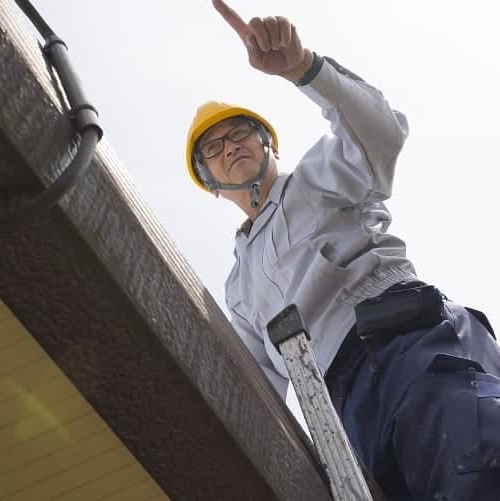How to find a home inspector
Contributed by Tom McLean
Oct 6, 2025
•7-minute read

When buying a home, the home inspection is your chance to look beyond the fresh paint or staged furniture to truly understand the property’s condition. Finding a home inspector who is trustworthy and thorough is essential. The right professional may spot what others might miss and give you the clarity you need to move forward with or walk away from the sale.
What is a certified home inspector?
A certified home inspector meets state requirements for training, education, and certification. To earn a license, an inspector must complete an accredited training process, gain minimum experience in the field, and pass an exam. Inspectors are legally required to be licensed or certified in most states. California, Colorado, Georgia, Hawaii, Idaho, Kansas, Maine, Michigan, Minnesota, Missouri, and Wyoming don’t require certification.
What makes a good home inspector?
Home inspections cost money and take time to complete, so you want to make sure you get an accurate report.
If you’re selling a home, you can get a pre-inspection to better understand its condition before you list it. This can help you and your real estate agent decide whether to make repairs before selling or adjust the asking price to compensate for any flaws.
Before choosing an inspector, consider the following qualities.
Current certification and licensing
Make sure your inspector’s professional licensing and certification are current. This can usually be verified by checking with your state government or by searching the International Association of Certified Home Inspectors® (InterNACHI) database.
Some states don’t require licensing or certification. However, you can still search for an inspector with certification to ensure they’re adequately trained.
Membership in a professional association
Membership in a professional association, like the American Society of Home Inspectors (ASHI) and InterNACHI, shows that the inspector follows a code of ethics and meets specific standards of practice.
These associations provide ongoing training and may require inspectors to be certified. Some associations, including ASHI, conduct background checks on their members to foster trust with the public.
Access to advanced technology
A home inspector with access to the latest technology can sometimes detect issues invisible to the naked eye or older tools.
Infrared technology can help detect overheating electrical systems, air leaks, and signs of rodents and other pests. Electronic radon monitors will detect radon in the home. Gas leak detection technology can help find any gas leaks. Water pressure gauges, moisture meters, or water test strips can uncover potential problems such as excess water pressure, hard or soft water, plumbing leaks, and moisture in walls and structural features.
While inspectors with this type of technology will provide a more detailed inspection, they may charge more. It may be worth the extra cost to know more about the home you’re buying. If the inspection report uncovers something that’s a deal breaker and you have an inspection contingency in your contract, you’ll have the option to walk away, saving you from a potentially costly home purchase.
Detailed quotes
Speaking of the costs of a home inspection, savvy buyers are sure to get a quote from several potential inspectors, offering a view into costs and professionalism. The quote should be transparent and leave no room for interpretation.
While the average price of a home inspection is $296 – $424, according to Angi.com, you’ll need to consider your location and the size of the home. Your detailed quote should include the cost of the inspection and a list of any additional services and their costs. The inspector may include referrals for specialized services. You shouldn’t expect a list of common repairs or issues and their costs.
Experience and special expertise
Choosing an inspector who can perform multiple types of inspections may result in a more detailed report, helping you better understand the home's condition. For example, if you suspect that something is wrong with the HVAC system after you tour the property, you may want an inspector who’s also trained to inspect HVAC systems.
The more areas the inspector specializes in, the more thoroughly they can inspect the home. This can help you save time since you won’t have to schedule additional inspections before moving forward in the buying process. Just remember that additional specialized tests will cost more than a standard inspection.
Professional network
Your home inspector should be familiar with the local area and qualified to inspect the home. They should also be able to refer you to repair services and inspection services that specialize in aspects such as foundations, chimneys, crawl spaces, pools, HVAC systems, or mold.
How to choose a home inspector
Now that you know what makes a good home inspector, you’ll need to know how to find them to put your new standards to work.
Ask friends and family
First, ask friends or family who recently purchased a home for recommendations. A firsthand account from someone you know can be more helpful than online reviews from strangers. And because you know the person, you’ll also be able to ask them questions, including:
- What did you like about your home inspector?
- Was there anything you didn’t like?
- What was your experience like working with them? Did they show up on time? Were they good at communicating?
- How much did they cost?
- Did you attend the inspection? If so, was it thorough, and did they answer your questions and explain things well? Did they use any technology or go the extra mile?
- Did you find any issues in the home after you moved in? Did your appraisal find any problems that your home inspector missed?
You usually can’t choose the person who performs your home appraisal, as they work for your lender. But you can choose your home inspector, as they work for you.
Ask your real estate agent
Your real estate agent is the next place to look for a recommendation. Real estate agents work with many buyers and may be able to recommend a reliable and trustworthy inspector.
Ask if your agent receives any compensation for their referrals. Ideally, you want to work with an inspector your real estate agent truly trusts, not one they’re getting paid to refer business to.
Read home inspector reviews
Online home inspector reviews can be helpful. While you may not be able to ask follow-up questions or get the full story of the situation from each reviewer, you may be able to see a pattern in the type of service the inspector provides and the experiences their clients have.
You can typically find home inspector reviews on such sites as NextDoor, Patch, Yelp, Angi, HomeAdvisor, and the inspector’s business page on Facebook.
Eliminate uninsured inspectors
If an inspector lacks insurance and is injured while inspecting your home, you could be held liable. Make sure they carry personal and professional liability insurance that covers their safety and any damage they may cause.
You’ll also want them to have professional liability insurance, known as errors and omissions or E&O insurance. This protects them from claims that they’ve made mistakes or overlooked an issue during their inspection. If they’re sued and the court finds them to be at fault, E&O insurance will help cover their legal costs and any compensation paid to you, the home buyer. If they don’t have E&O insurance, you may be on your own financially when it comes time to fix the issue, with no recourse to recover losses.
Review sample reports
You can ask inspectors you’re interested in hiring for sample reports, along with any expert advice, to see the quality of their work. Look at how thorough they are in their inspections, how detailed their reports are, and how in-depth they explain potential issues.
Reports often are generated using a standard software package, but it’s up to you to dig into the details to see if the contents stand up to scrutiny.
Interview inspectors
To help you feel more comfortable with your decision, consider interviewing potential inspectors to gather more information and get a better sense of how they work with clients. Here are a few questions to ask:
- Are you certified or licensed?
- Are you bonded and insured?
- Are you a member of a professional association, like ASHI or InterNACHI?
- Are you a full-time home inspector?
- How long have you been a home inspector?
- Do you have ongoing training and stay updated on new policies and trends?
- Can you take me through a typical inspection? How long does it usually take, and what can I expect?
- Do you use any special technology, or are you specialized in any type of additional inspection?
- What does your report include? Do you have a sample I can review?
- Can I get contact information for some references?
FAQ
Before you begin to search for one, explore some frequently asked questions about home inspectors below.
Is an appraiser the same thing as a home inspector?
A home inspection and an appraisal aren’t the same thing. A home inspector reports on a home’s condition, while an appraiser determines its current fair market value.
How can I ensure I get a reliable home inspector?
You’ll want to do some research and vet home inspector candidates to ensure you hire a qualified and reliable one. Look for an inspector who is certified, insured, and has good reviews.
Is waiving my home inspection a mistake?
While it can be tempting to waive the home inspection to avoid the expense and speed up the transaction, doing so could leave you buying a home with significant problems that require expensive repairs. A home inspection, along with an inspection contingency, allows you to ask the seller for repairs before the sale is complete. If you waive the inspection and uncover issues in your new home after you’re officially the homeowner, the repairs will be your responsibility.
What are the biggest red flags in a home inspection?
Some issues uncovered during a home inspection can be more than minor repairs. They can signal costly problems that affect your safety, comfort, and budget. Common red flags include structural concerns, roof damage, electrical hazards, plumbing issues, and HVAC problems. If your inspector flags any of these issues, don’t panic. If you have an inspection contingency, you can request repairs, negotiate a lower purchase price, or walk away if the problems are too extensive. A thorough inspection empowers you to make an informed decision that protects both your investment and peace of mind.
How much will I pay for a home inspection?
Home inspections typically cost $296 – $424, according to Angi.com, but vary widely based on location, the size of the home, and special features that could require additional inspection efforts, such as swimming pools or multiple HVAC units.
The bottom line: Carefully vet your potential home inspector
A trusted inspector can help you avoid paying more than you planned because of unexpected problems requiring repairs. And while finding the right inspector is an important milestone, remember it’s just one piece of the journey. There are other steps you’ll want to take first to set yourself up for success.
If you’re just beginning your search for a home, start your mortgage application with Rocket Mortgage® so that you’re ready to make an offer and find a home inspector when the right home comes along.

Eric Rosenberg
Eric Rosenberg, is a financial writer, speaker, and consultant based in Ventura, California. He holds an undergraduate finance degree, an MBA in finance, and is a Certified Financial Education Instructor (CFEI®). He is an expert in banking, credit cards, investing, cryptocurrency, insurance, real estate, business finance, and financial fraud and security.
He has professional experience as a bank manager and nearly a decade in corporate finance and accounting. His work has appeared in many online publications, including USA Today, Forbes, Time, Business Insider, Nerdwallet, Investopedia, and U.S. News & World Report.
Related resources

7-minute read
A buyer's home inspection checklist
Inspections verify the safety and integrity of a buyer’s future home. Here’s a buyer’s home inspection checklist with all the key informati...
Read more
8-minute read
How buyers can negotiate house price
Are you ready to purchase your dream home? Learn how to negotiate house prices to increase your chances of getting the best deal on your future home.
Read more

6-minute read
What is a seller’s pre-inspection?
As a seller, you might order a pre-inspection before listing your home to address any repairs and help prevent negotiations with buyers. Find out how it works.
Read more